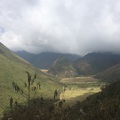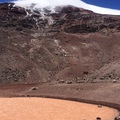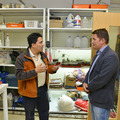25.07.2015.
Isla Negra
Despite its name Isla Negra is not an island, but a small and pintoresque town on the shore of the Pacific Ocean. It's beauty would be enough to attract the locals and the tourists, but furthermore here is the home of a Nobel literature prize awarded Chilean poet, Pablo Neruda. (The other Nobel-prize winner Chilean writer is Gabriela Mistral.)
Neruda was of a poor family, his mother died soon after his birth. His father, a locomotive driver, was always hard with him, later he married again. His stepmother was kind and loved him, he writes several times about her in his poets. However the lack of love, the poor circumstances during his childhood effected him.
He started to write poems as a child, although his father did not support him, and wanted him to learn a profession and go for a bluecollar job. He sent some of his poems to a literature competition in Santiago, which he won there price. After with the help of Gabrial Mistral, he started university in Santiago, which he never finished. Finally he entered the Chilean diplomatic service "for the living". He served in Batavia (Java) as consul, where he met a Dutch girl, they married and had a daughter. During his stay in Madrid he became friend to several famous poet such as Federico Garcia Lorca or Rafael Alberti. During one of his journeys he got known a rich Argentinean woman, Delia del Carril, 20 years older than him. She adored him as a poet and loved him as a man. They became lovers. Finally he divorced his Dutch wife who moved to Amsterdam with his daughter, they never saw each other again. Neruda and Delia lived in Paris, where she introduced Neruda to leftist, progressive intellectual elite of its time.
She bought a piece of land on the shore of Isla Negra in 1939, where they built there common house. They slept separate. Neruda's bed was next to a big window with view to the see, he loved so much. Neruda was a well known communist sympathiser, after the Spanish civil war, a real communist thinker and nearly a politician. That's why the Chilean government sent him to exile for several years, actually he had to fled from the country. During his exile in Mexico he got known Matilde Utturia. They fell in love and started an affair. He bought a house in Santiago's (that time suburban) Bellavista district, which they used for the get-togethers. It became famous as "La Chascona". Of course the affair turned to light and led to a divorce of the second wife and the marriage of Matilde. They rebuilt the house of Isla Negra, added several rooms. Their common matrimonial bed had a special position in the house: the sun rose at their head and set on their feet, while through a big window they could see the see. Neruda was a very special man, he was collecting literally everything: strange colourful crystal and ceramic glasses (including a Hungarian collection of green ceramic wine and palinka glasses, which are part of the exhibition), wooden figures (fiddle-heads) from the rostrum of wracked ships (there are around ten in his living room), signs form hotel rooms or streets (eg. "No smoking please", "change of towels every Monday"), signs and advertisements of shops (had a huge wooden made shoe from a shoe store and a 2m high wooden horse from the blacksmith of his birth town), handmade new and original (Aztec, Inca, Eastern-islander, African and Chilean tribal style) masks and figures, hats and helmets (military, fireman etc.), ties and bow ties in every shape and colour, he had around 8 million (!) pieces of see-shelves and 10.000 books, which his third wife donated to Chilean universities after his death.
He had an own bar under his house with view to the see, where he invited his friends to have dinner, drinks and cocktails prepared by him and play cards. The nights started with drinks on clear colour glasses, when the mood was on the top he started to give drinks in colourful green and blue glasses, and when the "party was over" he started to serve the drink is brown or black glasses. He had a similar virtue with foods. When he wanted the end the party he started to serve a "ham and eggs" made of plastic.
He had a heart attack when heard the news about the coup d'état of Pinochet, and he died two weeks later in the hospital. His body hopefully will rest (again soon) in the garden of his house in Isla Negra next to his third wife, where he could hear the song of his beloved see. (After the forensic analysis of his rests and the judiciary process will end regarding the suspect of his poisoning by Pinochet's forces, raised few years ago.)




